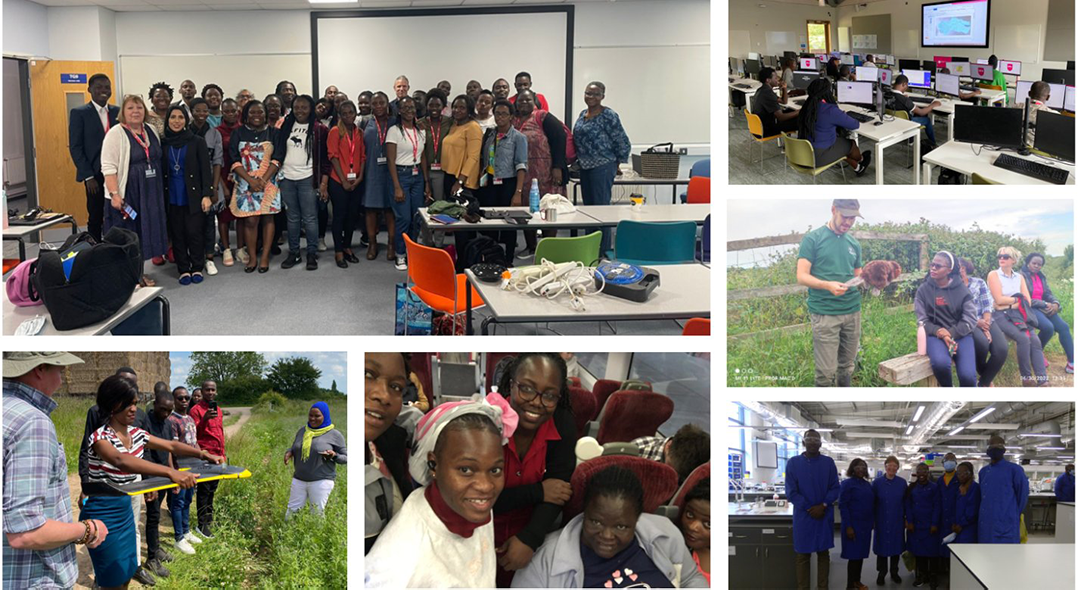
Earlier this year, students and faculty from Makerere University visited Nottingham Trent University (NTU), United Kingdom (UK) to participate in a two-month Erasmus + International Credit Mobility programme. Among the team of 37 students and faculty who traveled, were three faculty and seven students from the Makerere University School of Public Health (MakSPH). The students included three undergraduate students pursuing a Bachelors of Environmental Health Sciences and four postgraduate students pursuing a Masters of Public Health. I was privileged to have been part of this exchange as an undergraduate student and the mobility gave me the opportunity of my lifetime. I am grateful for the opportunity of participating in the Erasmus+ programme because it has improved my knowledge through what I learnt during my two months stay in the UK.
While at NTU, we participated in a number of activities such as lectures and sessions on effective time management, statistical analysis, academic writing and referencing, and critical thinking. We also attended public health talks on health promotion and impactful research. My most interesting public health talk was about the work of Healthwatch and its involvement in the refugee community in Nottingham. Healthwatch is a public health entity in Nottingham aimed at carrying out outreaches and engagement programmes to understand the needs and challenges of refugee communities. According to Dr. Abudullah Saaidi, an officer of Healthwatch Nottingham, the organization is mandated by statutory instrument to evaluate the services of the health system and holds the local health and care leaders accountable by ensuring they engage with the community clearly and meaningfully. The Healthwatch ensures the views of marginalized groups such as refugees are heard by the relevant authorities including public health officials. The session helped me understand the concept of community involvement in public health for sustainability, ownership, behavioural change, and community development. As MakSPH students, we also reflected on and discussed how such an organisation in Uganda would help the Ministry of Health to account for service delivery in the country.

Furthermore, I also participated in a series of academic sessions such as writing retreats and workshops learning through board games. The writing retreats were done collectively as a team of Makerere together with NTU. The writing retreats were organised in a unique way whereby at the beginning of each session, we wrote down our objectives and proceeded into the writing exercise. Attendees would use this time to work on proposals, concepts and manuscripts. At the end of the day, we would share with the other participants what each person would have achieved in comparison with targets set earlier on at the start. The writing retreats helped me improve my research writing skills, and literature selection. In addition, I was able to design my PowerPoint presentation for the 10th International Festival of Public Health held at the University of Manchester. I made an oral presentation about my undergraduate research titled “Knowledge, attitudes and practices on personal protective usage and adherence among grinding mill workers in Bugiri District”. This was possible because of the exchange programme. I got my first opportunity to present my research at an international conference. This whole experience prepared me and I learnt how to present research findings, improve my public speaking, as well as master my presentation skills.

There was a diversity of disciplines which were involved in the exchange programme and we engaged in a number of multi-disciplinary activities. We participated in an antimicrobial stewardship challenge involving microbiology, pharmacy, nursing, and public health students. We were able to learn how to use biofuels for sustainability. This session was exciting as I learnt the role of One Health in tackling not only AMR but also other diseases such as malaria. Therefore, basing on this experience, I recommend the use of board games at Makerere University which will enhance participatory learning, exchange of knowledge, and fun.

To close off the two months stay in Nottingham, a conference Connecting globally was organized at the NTU Clifton campus. This was special because it involved both teams of the exchange programme from Uganda and Kenya. During this conference, together with my course-mates, Nakalawa Suzan, and Audo Tabitha, we made a video presentation about sustainable futures showing an environmental health perspective. In the video, we shared about how Uganda is embracing sustainable futures, and what can be done to improve environmental sustainability in Uganda. (Click to watch the presentation here). As we worked on this presentation, I got to learn how sustainable cities such as Nottingham incorporate trees thus providing resting parks for example the Arboretum Park and Wollaton parks. I appreciated the mechanical techniques for managing solid waste such as the use of heil garbage trucks which ensure large waste quantities are collected, compacted, and transported to disposal sites. addition, the city of Nottingham has colour-coded waste bins at various points in the city to ensure segregation. Lastly, I learnt how transportation uses renewable energy such as biogas in the bus system and electric cars. This was avoiding environmental pollution as well as limiting emissions from cars in terms of greenhouse gases thus protecting the atmospheric ozone and reducing particulate matter in the atmosphere.
In conclusion, the 2 months at NTU were very educative. My experience helped me gain more knowledge in public health from a high-income country perspective. I have also learnt other skills such as presentation skills, team working, public speaking, and communication. I am so grateful to Prof. Linda Gibson, a Professor of Public Health in the School of Social Sciences at NTU, and Dr. David Musoke, a Senior Lecturer in the Department of Disease Control and Environmental Health at MakSPH for the partnership they initiated between the two universities. I also thank them for leading such an exchange programme which has offered us learning opportunities as well as travel opportunities. My appreciation also goes to the European Union and British Council for funding and supporting the Erasmus+ International Credit Mobility programme.

Complied by Wejuli Junior Mike

